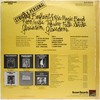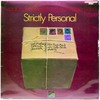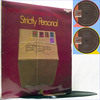Year: 1968 (LP 1969)
Label: Sunset Records (UK), SLS 50208
Style: Experimental rock, Blues rock, Avant-Garde
Country: Glendale, California, USA
Time: 38:30
Format: Flac Tracks 16/44,1 kHz
Size: 232 Mb
The only white voice that has come close to capturing what Charley Patton and Son House are all about, Captain Beefheart has gathered some superb musicians, very heavy and with much Delta feeling. Therefore, he has, one would suppose, the capability of making the ultimate white blues album.
He has not done so. His first album (Safe As Milk on Buddah) failed by lapsing into dull commercial rock on the order of Love’s early efforts. This one fails by lapsing into dull commercial rock on the order of noisy, discom-bobulated freakout shit. But as with Safe As Milk, the failure of Beefheart’s new effort is by no means total. If you can wade through all the liquid audio, there are veins of pure Delta gold in these grooves. For the fleeting moments when the bottleneck guitar is flailing, and Beefheart is using his voice to its full potential, the Magic Band is within cutting range of any white blues group alive.
But we’ve heard phasing (the “jet-airplane sound”), heartbeats (a la Buffalo Springfield), tapes played in reverse, wavering echoes and all those zapping effects before. And that’s all they are, they aren’t integral musical materials like the weird sounds of electronic music. “Beatle Bones & Smoking Stones” is charming enough with its psychedelic W. C. Fields gibberings, but it is cut so bad by “Gimmie Dat Harp Boy,” which follows it, that you know right away which track is going to survive.
Now the $64 question. With its numerous lapses in taste, does this album representa€”1) the world’s greatest white bluesman, frustrated by evil A&R men, or 2) a competent musician, capable of occasional titanic moments, or 3) a hack performer who, through the genius of his producer, now and then blows the mind?
Only Don Van Vliet of Lancaster, Calif. (known professionally as Capt. Beefheart) and Bob Krasnow of L.A. (known professionally as Blue Thumb Records) know for sure. Let it be clear that I don’t put Beefheart down for using the blues for psychedelic purposes. The transitions (read “flashes”) between that version of Nirvana that was born and raised in the Mississippi Delta, and that version which modern worldwide post-Beatle rock aspires to, are the essence of whatever genius may lurk in this album. And genius or no genius, the musicianship is just too good to pass up. Blue Thumb, a new label, is also going to be issuing some albums by black bluesmen; let us hope they have the same excellent engineering that marks this Beefheart album.
(Rolling Stone magazine. December 7, 1968 5:00AM ET)
01. A1 Ah Feel Like Ahcid (03:02)
02. A2 Safe As Milk (05:22)
03. A3 Trust Us (08:02)
04. A4 Son Of Mirror Man - Mere Man (05:17)
05. B1 On Tomorrow (03:24)
06. B2 Beatle Bones N' Smokin Stones (03:15)
07. B3 Gimme Dat Harp Boy (05:01)
08. B4 Kandy Korn (05:03)





KatFile Mega4up UploadRar TurboBit DiskYandex

No comments:
Post a Comment